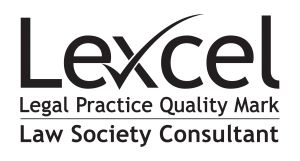What is Lexcel?
When people talk about the ‘Lexcel standard’, they are referring to the official quality mark for legal practice set by The Law Society.
The aim of the standard is to provide a clear and consistent benchmark of quality for client care, compliance and practice management.
It covers the following areas:
- Client care
- Risk management
- People management
- Structure and strategy
- Financial management
- Information management
- File and case management
Some law firms say that Lexcel brings order and cohesion, in large part due to a focus on continual reassessment.
The standard is designed to improve and develop operational efficiency, risk management, client service and law firm profitability.
Benefits of Lexcel
There are many potential benefits of becoming a Lexcel accredited firm.
The rigorous process of achieving the quality mark forces firms to get their house in order. If you are one of the many law firms that struggles to get people to follow processes, Lexcel is a useful weapon in the armoury. Nobody wants to let the side down.
Achieving the gold standard of legal practice management is something to celebrate. It can boost morale and can be used for marketing. Procurement teams are often impressed (and it can be a requirement of some public sector clients).
It also forces firms to have effective day-to-day management processes. You won’t get away with failing to follow your own procedures. Whilst some might see this as ‘red tape’, to others it means having effective processes to allow the firm to grow.
Lexcel is also pretty flexible. There is no single ‘right’ way of implementing the standard. Assessors have a wide discretion.
Advocates of Lexcel also say that accreditation can have a positive impact on:
- number of complaints
- client retention
- overall profitability
- general regulatory compliance (including SRA, AML and data protection)
- time management
- process efficiency
Firms are also able to add the Lexcel logo to marketing materials and their accreditation is flagged on the Law Society’s Find A Solicitor.
There is a general consensus that the Law Society could do much more to promote the Lexcel standard. If and when they do, accredited firms should benefit from the Society’s increased marketing.
Lexcel accreditation should make it easier for property firms to get on lender panels.
What about insurance – can it help with that in a world where PII premiums are sky-rocketing?
Well, it’s complicated. Some would suggest yes, it can lead to lower premiums as it does tend to show that the firm has a proven approach to risk management. But can that be proven? No. Insurance underwriting is a dark art. Run away from any Lexcel consultants promising instant insurance reductions.
Are there any drawbacks?
As with anything, there are pros and cons.
Here are some of the oft-cited drawbacks:
- It is very time consuming. Accreditation, reassessment and keeping on top of the systems is not to be taken lightly.
- You need to be all-in. There is no room for half-heartedness. It needs more than one enthusiastic internal champion.
- It’s likely to be a long term commitment (‘losing’ accreditation won’t look good).
- The weeks leading up to reassessment visits can be a stressful and interfere with important work.
- Some find the standard too rigid and that it encourages box-ticking behaviours.
- Lexcel accreditation is not to be confused with regulatory compliance. Whilst it is true that Lexcel accredited firms tend to be less likely to end up in the SDT, compliance and accreditation are entirely separate.
- As more firms achieve Lexcel, standing out is harder than it used to be.
- It can be quite an investment (direct costs, consultants, lost fee earning time).
Is Lexcel suitable for everyone?
In a word, no.
Although technically all law firms (and in house legal departments) can apply, not everyone should.
If you cannot commit the time, energy and money required to get and remain accredited, you should not apply. If you will have to drag people along kicking and screaming, it will be a painful experience.
You need to go in with your eyes open.
However, Lexcel can be a fantastic facilitator to improve all aspects of a legal practice. It is a proven model, that you effectively buy off the shelf and implement.
Law firms that throw themselves into accreditation with enthusiasm and firm-wide commitment often experience benefits far outweighing the costs.
What is the process, and how much does it cost?
If you are interested in being Lexcel accredited, then you can find out more about the process of how to apply here.
Suffice to say, initial accreditation needs a lot of preparation and is not a quick process (budget at least six months). To retain your accreditation, there are formal ‘maintenance’ visits where you will be reassessed all over again.
Not even a global pandemic stopped the Lexcel assessors.
The cost can vary depending on the size of your firm, but a full list is given on this page.

If you would like help becoming Lexcel accredited please contact us. We are are accredited by the Law Society and are lucky enough to have a talented team of very experienced and enthusiastic Lexcel consultants and assessors.








